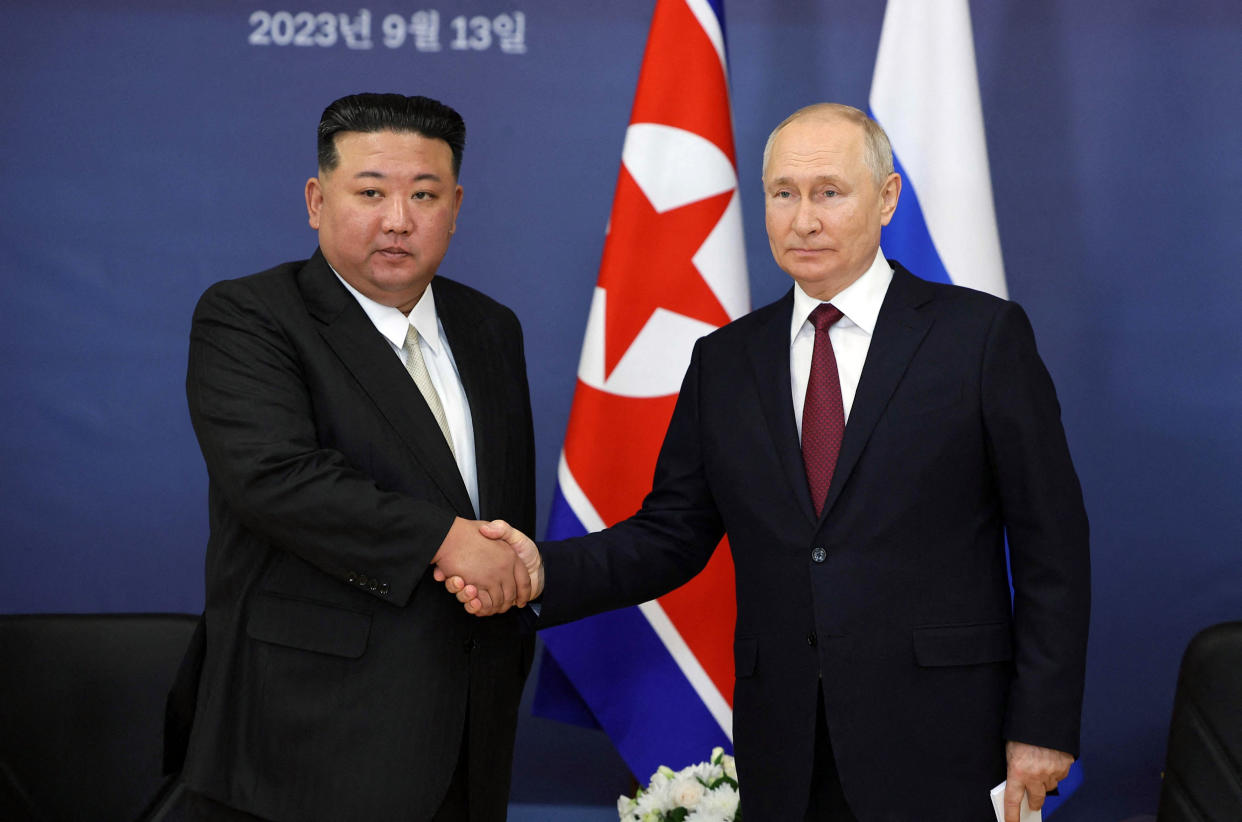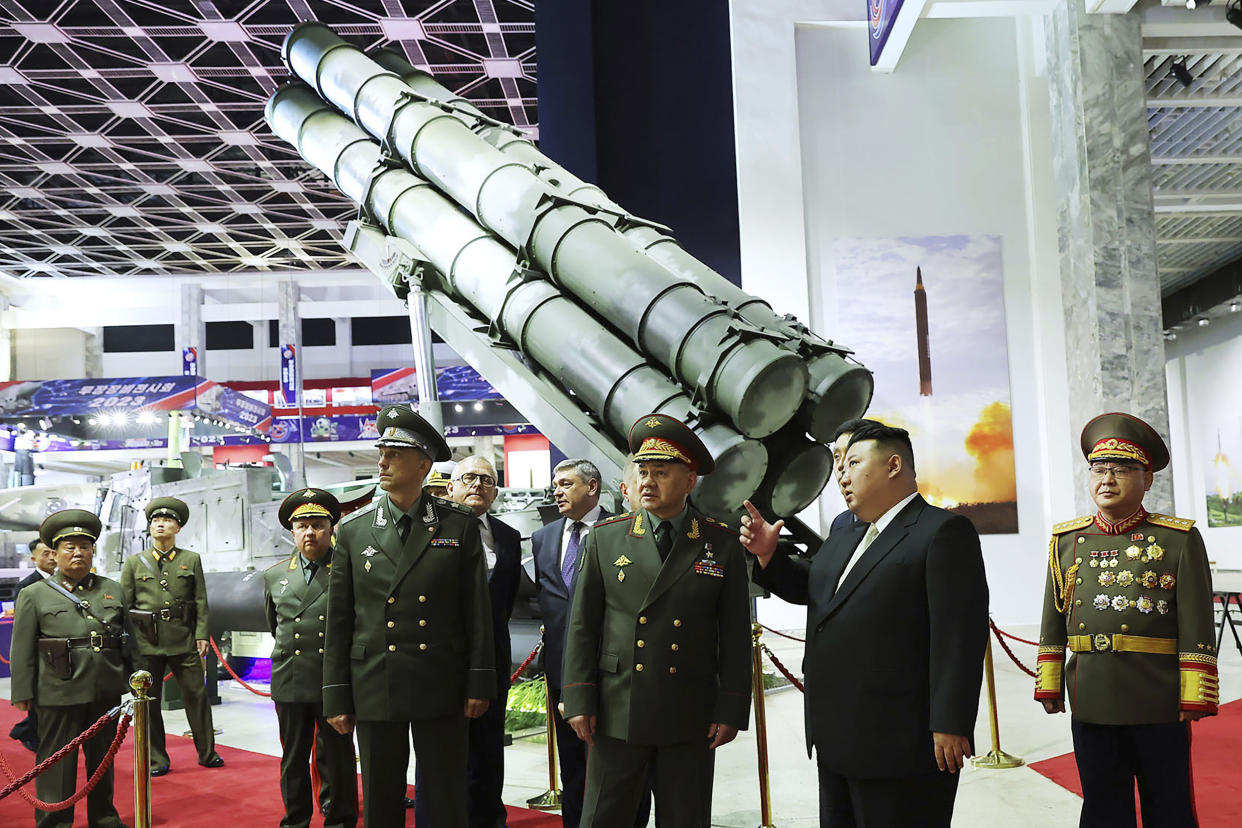What might Kim have that Putin's military needs in Ukraine?
Russia rolled out the red carpet for North Korean leader Kim Jong Un, who stepped off his armored train this week and into a welcome that underscored just how important his reclusive regime has become for its neighbor.
Russian President Vladimir Putin’s invasion of Ukraine has left him short not only of friends, but also munitions to sustain his frustrated military.
The United States’ warnings about the North Korea-Russia summit illustrated concerns that Kim may agree to supply the ammunition that Moscow’s war effort seems to need.
But what could the summit actually mean for Putin and his guest?

What does Russia need?
Mired in a war he hoped would have been over many months ago, Putin’s military is short of ammunition but fighting a conflict increasingly dominated by it, analysts said.
Russia is still ramping up its own production and its increasing global isolation has left Moscow looking elsewhere.
The White House warned last month that Russia’s arms negotiations with North Korea were “actively advancing,” and that Kim and Putin had exchanged letters pledging to increase their cooperation. Artillery munitions were likely to be a particular focus, it said.
It’s hard to say exactly what was on the agenda at the Vostochny cosmodrome, but such a rare summit was likely motivated by the fact that Kim had something his host felt he needed.
Putin’s shopping list is pretty clear, said Michael Horowitz, an analyst who is the head of intelligence at Le Beck International, a security and risk management consultancy.
“The Russian president wants ammunition,” he said.
“The fighting in Ukraine is very much driven by artillery: Simply put, if you can fire more at the enemy, you have a better chance of success,” Horowitz added.
The White House has already accused North Korea of covertly supplying a “significant number” of artillery shells to Russia last year.
But the timing of Kim’s trip is significant, with Ukraine pushing to break through Russian lines before winter in a counteroffensive loaded with Western weapons.
A fresh supply of artillery from Pyongyang could further complicate Kyiv’s efforts.
The conflict has turned into an “artillery duel” more akin to the two world wars than modern warfare, said David Silbey, a military historian at Cornell University, with Russia firing an estimated 20,000 rounds a day compared with 5,000 by Ukraine, whose shells are mostly supplied by the U.S.
North Korean shells, he said, would “allow the Russians to continue to hold those lines” in the hope that Ukraine will run out of ammunition first.
Analysts said it’s difficult to assess exactly how much ammunition the reclusive state might have stored and readily available for shipping, or whether that stockpiled ammunition is in a battle-ready condition. It also remains unclear just how much ammunition North Korea is producing, and if it has the capacity to significantly expand its production, should the Kremlin ask it to do so.
But two types of shells (122 mm and 152 mm caliber munitions regularly used by Russia in Ukraine) and anti-tank missiles would likely be of particular value to the Kremlin.
“North Korea would certainly have large stocks of Russian/Soviet standard ammunition, stocks that could provide real support for the Russians, who are using ammunition at a prodigious clip,” said Phillips O’Brien, a professor of strategic studies at the University of St. Andrews in Scotland.
Russia already sources drones — a cheap but effective weapon designed to wear down Ukraine’s air defenses — from Iran, another Western adversary.
But while the Kremlin may be looking for an edge on the battlefield, could doing a deal with North Korea instead actually help refill Kyiv’s coffers?
South Korea, a key Western ally, also possesses large stocks of U.S. standard ammunition and the production capacity to make large amounts of it, O’Brien said.
Seoul has so far refused to provide lethal aid to Ukraine to avoid angering Russia, but on Thursday expressed “deep concern and regret” about the summit’s apparent focus on military cooperation.
“They may decide that if North Korea is backing Russia so openly, that they will provide similar aid to Ukraine,” he added.

What could the North get in return?
Since Kim’s nuclear diplomacy with then-President Donald Trump collapsed in 2020, he has been vying for the world’s attention with a campaign of weapons tests. This barrage continued ahead of the summit, with North Korea firing two short-range ballistic missiles toward its eastern seas early Wednesday.
These shows of military strength may be designed to force the world into accepting North Korea’s weapons program and easing sanctions for his impoverished nation. But now Kim appears to have something a major international leader wants, offering legitimacy and relevancy on the international stage at the other end of a long train journey.
Russian Defense Minister Sergei Shoigu, who visited Pyongyang in July, has already floated the idea of joint military drills, which would be a first for the isolated nation and a major boost for Kim’s status internationally.
Pyongyang, which has been heavily sanctioned and is still recovering from pandemic border closures, could seek much-needed humanitarian, energy and economic help from Moscow in exchange for arms.
More worryingly for the U.S. and its allies, it could also secure Russian technology that had been out of its reach, Horowitz said, although it’s unclear how far Moscow is willing to go to give higher-end technology in exchange for what really are basic weapons.
The venue for the summit may have hinted at this.
During his tour of the spaceport in Russia’s far east, Kim appeared to ask detailed questions about the technology used there. Putin said that he was “showing great interest in rocket technology,” and that North Korea was trying to develop its space industry.
Pyongyang could get advanced technology for satellites, nuclear-powered submarines and ballistic missiles, Victor Cha, senior vice president for Asia and Korea Chair at the Center for Strategic and International Studies, a research organization in Washington, said in an analysis for NBC News.
Historically, North Korea relied on technology from the then-Soviet Union, with which it was politically and economically aligned until the latter’s fall in the 1990s, for its missile program and even recruited Soviet experts to help build it, according to the analysis.
The U.S. has sought to paint Kim’s visit to Russia as evidence of Putin’s failing campaign in Ukraine.
“Not only has he failed to achieve his goals on the battlefield, but you see him traveling across his own country hat in hand to beg Kim Jong Un for military assistance,” State Department spokesman Matthew Miller said earlier this week.
But Cha said the U.S. and its allies have “limited policy options in addressing” the challenge of the growing cooperation between Russia and North Korea.
“The tactical advantage that each foe gains in expanding cooperation complicates U.S. efforts in the war in Ukraine,” he added.
